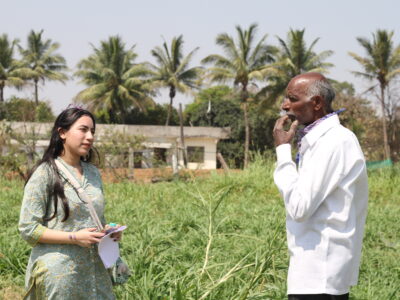
Columbia Dining and the Office of Sustainability partnered with the Climate School’s Undergraduate Program in Sustainable Development to offer a capstone project this fall semester, as part of the program’s senior Workshop in Sustainable Development course. The project explored ways of cutting Columbia’s food-related emissions and led to Columbia’s participation in the New York City Plant-Powered Carbon Challenge.
Titled “Spicing up John Jay Dining Hall: Reducing Scope 3 Emissions,” the capstone focused on measuring and reducing emissions from the procurement of food, in addition to studying the eating habits of meal plan holders to learn ways to influence the adoption of plant-based eating.
In measuring emissions, the group found that ruminant meat (that of herbivorous grazing animals like cows) comprises 72% of Columbia Dining’s total carbon cost, but only 13.4% of its purchase weight. This means that even a small amount of purchased ruminant meat causes a disproportionately high carbon footprint compared to plant-based foods. In fact, the team found that purchasing plant protein causes 38 times less emissions by weight than purchasing ruminant meat.
At the students’ recommendation, Columbia Dining became the first signatory to the Plant-Powered Carbon Challenge, a NYC-wide initiative to reduce carbon emissions through plant-forward food. As part of the challenge, Columbia Dining has committed to reducing its food-based carbon emissions 25% by 2030 through a plant-powered procurement strategy for its operations.
“It is rare that students can work on a capstone project and in the same semester see the fruits of their labor be recognized and implemented while the course is still underway,” said Jessica Prata Cianciara, assistant vice president for the Office of Sustainability at Columbia. “This semester, that is exactly what has happened.”
Participation in the challenge complements other initiatives already underway in Columbia Dining and supports the goals outlined in Columbia’s Plan 2030. The announcement was made at the NYC Carbon Challenge Meeting on December 5, 2023 organized by the Mayor’s Office of Climate and Environmental Justice and hosted at Faculty House by the Columbia University Office of Sustainability
The capstone group—Angela Ahn, Andreea Diaconu, Sherrye Ye, Suie Choi and Johanna Martinez, advised by faculty member Jenna Lawrence and teaching assistant Alin Risfenti—conducted interviews with eight food experts and partnered with NYC Food Policy, the NYC Mayor’s Office, Greener by Default, and CoolFood throughout the project. In addition to research conducted in academic journals, the students used food emissions calculators, dug into Ivy+ Dining practices, and used CoolFood’s calculator to process Columbia Dining’s procurement data.
The group also conducted student surveys and interviews to glean the eating habits and preferences of meal plan holders. Among other findings, they concluded that students highly value taste, love culturally diverse dishes, and that most omnivores are willing to incorporate a few meat-free meals per week. These findings informed the group’s recommendations to “spice up” plant-based meal offerings to influence omnivores to choose them over meat dishes.
The capstone group included recommendations for the Columbia Dining team to consider in its operations, menu planning, event strategy and communications approach. Next steps include analysis of procurement data, assessment of menu strategy and plan development for next steps and reporting progress to the NYC Food Policy team.
“By framing Columbia’s campus as a living lab, we are able to engage our committed and passionate students in real-world sustainability challenges that sit in their own backyard,” said Jason Smerdon, professor of climate. “Projects like this demonstrate how the research and educational missions of the university go hand-in-hand with its operational commitment to sustainability.”



